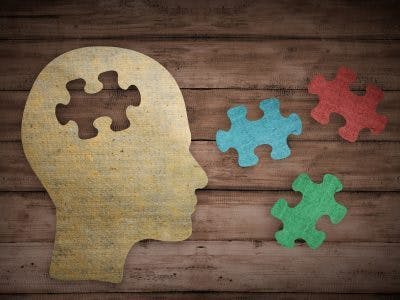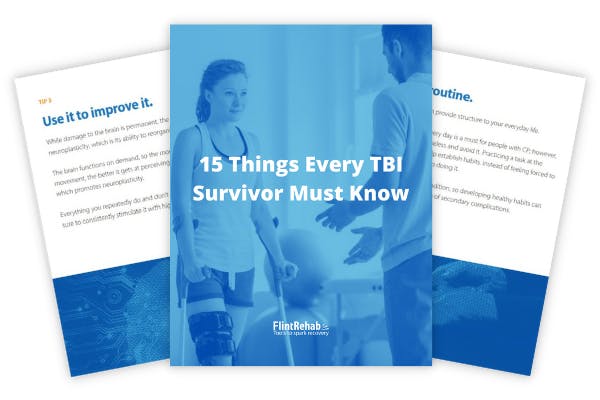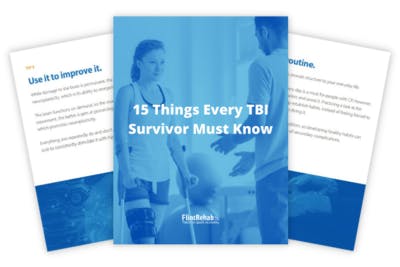No products in the cart.
No products in the cart.
No products in the cart.
No products in the cart.
Home » Neurological Recovery Blog » Traumatic Brain Injury » TBI and Autism: Is There a Link? (Understanding Similarities and Treatment)
Last updated on March 16, 2020

Is there a link between TBI and autism? Can a brain injury cause autism?
While many symptoms of TBI and autism overlap, there is currently no evidence to suggest that a brain injury causes an increased risk of autism.
However, because the two conditions are similar, some of the interventions used to manage autism may also be helpful for TBI patients.
Today you will learn more about the similarities and differences between autism and brain injury and how treatments for autism can help TBI patients increase their social functioning.

Autism spectrum disorder (ASD) is a neurodevelopmental disorder that affects how a person perceives and communicates with others.
There is a wide range of symptoms and severity within the spectrum, and the disorder now includes conditions that used to be considered separate, such as Asperger’s syndrome. Asperger’s syndrome is generally thought to be at the mild end of the spectrum.
Most children with ASD show symptoms within the first year, though some do not develop problems until about the age of 2.
Some of the early signs of autism include:
Many on the spectrum have a heightened sensitivity to stimulation but a dulled sense of pain. Therefore, they may perform behaviors that cause self-harm, such as biting or head-banging.
There is no single, identifiable cause of autism spectrum disorder, although genetics seem to play a major role. No reliable studies have shown a link between vaccines and autism.
Although there is no cure for autism, early intervention can help many people on the spectrum live happy, productive lives.
Autism, by definition, is a developmental condition, which means it is present from birth. Therefore, a brain injury does not cause autism in adulthood. To be diagnosed with autism, a child would have to miss certain common milestones, such as:
Other early signs include unusual reactions to sounds, smells, and lights.
However, while brain injury does not cause autism itself, the two do share similar mechanisms. For example, both can cause gastrointestinal problems which can affect brain function. In particular, both TBI and autism cause a change in gut microflora, which studies have shown changes the way that the brain responds to stress.
These shared mechanisms may explain why there are so many similarities between people with brain injury and those with autism.

TBI and ASD share many of the same characteristics. They both cause deficits in social judgments and communication skills and problems with regulating behavior. Other similarities between brain injury and autism include:
There are also several differences between TBI and autism though. For example, a frontal lobe injury often causes problems with empathy and self-centered behavior. However, contrary to popular stereotypes, most people with autism do not lack empathy. They just struggle with social norms.
Because autism and brain injury do share so many characteristics though, the interventions used to treat autism can be helpful for brain injury patients, and vice versa.
There are many treatments aimed at minimizing the effects of autism that can help people with TBI improve their social skills and behavior.
The following are a few of the best therapies used to treat both TBI and autism:

Applied behavioral analysis is one of the most researched and effective interventions for autism. It’s also been used successfully with brain injury patients with similar issues.
ABA involves breaking down skills into component parts and helping patients learn them through repetition and reinforcement. It also teaches patients how to avoid unwanted behavior such as emotional outbursts.
This therapy is best suited for patients with severe cognitive disabilities or for young children.
This therapy is best suited for TBI survivors or people with autism who don’t have severe cognitive difficulties, but who still have trouble controlling their emotions and behavior.
The goal of cognitive-behavioral therapy is to help a person understand their actions and find out what triggers them.
For example, maybe the person tends to get stuck on negative thoughts and emotions, and this leads them to get more easily upset. Or maybe it’s something as simple as hunger that triggers your anger.
Whatever it is, once the patient identifies their triggers, the therapist will work with them to discover ways to either avoid it or cope with it in a healthy way.

Insight-oriented psychotherapy is similar to CBT, but instead of focusing on triggers it focuses on negative beliefs.
The beliefs IOP addresses aren’t necessarily conscious, but they shape how you see the world and as a result they affect your behavior.
For example, a therapist might help a patient discover that they believe people don’t like them because of their brain injury, which makes them more hostile to others.
Once the person discovers these beliefs, the therapist will teach them ways to replace negative thoughts with positive ones.
Combining insight therapy with behavioral therapy is often the most effective approach.
This therapy focuses on helping patients establish meaningful relationships, something both autism patients and TBI survivors struggle with.
One of the skills this therapy focuses on is motivation to engage with others. The therapist works on building up the skills necessary to accomplish this such as sustained eye contact and back-and-forth communication.
It is common for parents, family members, and caregivers to take part in this therapy as well.
Autism and brain injury share many similar symptoms. Both cause people problems with social behavior and communication, and both can make the person more prone to emotional outbursts.
But because autism and TBI affect the brain in similar ways, the interventions used for one may also benefit the other.
Therefore, TBI patients, especially those with executive dysfunctions, might consider trying therapies that have been traditionally used for autism, such as behavioral therapy.
We hope this article has helped you learn more about the relationship between TBI and autism.

If you like our content, you’ll love our ebook and newsletters! Get instant access to our TBI recovery tips ebook with 20 pages of helpful advice by signing up below.
You’ll also receive our emails that share survivor stories and more useful TBI recovery tips, which you can opt out of at any time. (We know you’ll love them, too.)
We will never sell your email address, and we never spam. That we promise.


Time with a speech therapist is extremely valuable during recovery, especially if you struggle with communication, critical thinking, or memory after brain injury. Insurance typically covers speech therapy for a fixed amount of time. But once it’s over, recovery is in your hands.
That’s why a team of neuroscientists and clinicians from Boston University created the CT Speech & Cognitive Therapy app. Designed for those recovering from stroke, TBI, or living with neurological conditions, the app contains over 100,000 cognitive exercises that are all available right from your phone or tablet. That’s like having a speech therapist by your side whenever you want!
This app is the perfect fit if you want to improve your speaking, memory, or general mental sharpness. And, it’s affordable at just $29.99/month!
“For the past 6 months, my son has used the app about three times a week. The app is like a virtual therapist, it’s very easy to use, and it gives him immediate feedback.
He now understands things faster, can make decisions with less hesitation, has improved recognition of words, and his confidence is higher. I also find it easy to get in touch with customer service; they pleasantly help out. The whole experience has been great.”
— Miriam
With the CT App, you can get the guidance you need right from your phone or tablet. You can use it on your own or in between sessions with your speech therapist.
Whether you struggle with aphasia, memory loss, or critical thinking, the CT Speech & Cognitive Therapy App can help.
“The CT app has helped me gather my confidence by building on and reinforcing old forgotten skills. It helps to see my percentages increase, and work harder when they decrease. It’s very self-motivating.” -Kathryn
We are confident that this app will help improve your speech and cognitive function after brain injury. Like our recovery tools, the CT App is also covered by our 30-day money-back guarantee.

Do you know these 15 TBI recovery tips?
Get a free copy of our ebook 15 Things Every TBI Survivor Must Know. Click here to get instant access.
Grab a free rehab exercise ebook!
Sign up to receive a free PDF ebook with recovery exercises for stroke, traumatic brain injury, or spinal cord injury below: